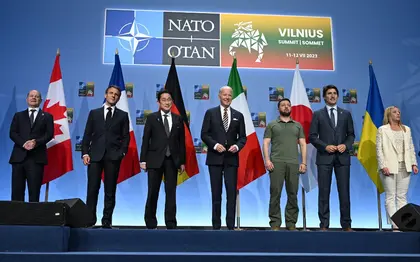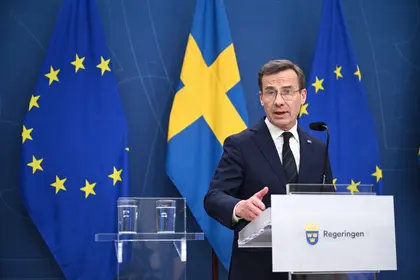The NATO summit in Vilnius was a historic one. The announcement on day one that Sweden was to become the 32nd NATO member will be remembered as the Summit’s principal achievement. The 31 NATO members convened at a time when the Alliance seems stronger and more united than it has ever been due to its response to Russia’s illegal war of aggression against Ukraine. All eyes were on the thorny question of Ukraine’s admission to NATO set against the alliance’s concerns about Russia’s reactions. Divisions within NATO over policy towards Ukraine have been a recurring theme since Russia invaded Ukraine on Feb. 24, 2022.
The consensus among seasoned diplomats was that the Vilnius Summit could not repeat the mistakes of the 2008 Bucharest summit statement which issued a vague declaration on Ukrainian membership, which came across as an empty, amorphous pledge as it failed to provide a concrete time frame. That is why President Volodymyr Zelensky, before arriving in Vilnius on Tuesday, called not only on a pledge of support for Ukrainian admission to NATO, but also on a firm timeline, so as not to repeat the mistakes of Bucharest.
JOIN US ON TELEGRAM
Follow our coverage of the war on the @Kyivpost_official.
The NATO alliance pledged continued military support for as long as the war continues, the training of Ukrainian soldiers, and intelligence sharing but, other than discarding the requirement to complete a membership action plan (MAP), Ukraine’s long-awaited assurance of NATO membership did not appear.

Russian Disinformation and Biden’s Battle to Sell Support for Ukraine
“I think these are all good, practical steps that should accelerate the process of Ukraine being able to join the alliance later,” said Kurt Volker, former US Ambassador to NATO on the “Amanpour & Co” TV program on Monday. “But we do have to ask the question: what is the political meaning of these steps? Is it to actually avoid admitting Ukraine to NATO for as long as possible or is it seen as a pathway? I think it’s very important NATO make clear that this is a pathway.”
While the Bucharest declaration, issued in April 2008, stated that “We agree today that Ukraine and Georgia will become members of NATO,” the statement gave no timeline and no firm commitments. The declaration was hailed at the time as a major achievement because it was the first such NATO declaration made in support of Ukrainian membership.
Russia expressed its profound displeasure with the Bucharest declaration through action: in August 2008, Putin’s army rolled into Georgia and annexed two areas where they remain today. Russia first invaded Ukraine in 2014 and, seeing the half-hearted response of the West, launched its full-scale invasion in February 2022. Plainly aware of the NATO “rule” that it will not admit countries at war, Vilnius has assured Putin that Ukraine (and Georgia) will remain outside NATO as long as it is at war, incentivizing Russia to continue the fight. It is this very fact that has made Western European member states hesitant to provide any assurance of membership that is accompanied by a set date.
“The sole task [in Vilnius], and one that all allies agree on,” one senior NATO diplomat told the Financial Times the day before the gathering, “is that we left gray areas on the map 15 years ago [in Bucharest] which Putin took advantage of, and now we need to make sure there is no more gray. It is about making crystal clear where the lines are.”
The otherwise encouraging statement made by NATO secretary general Jens Stoltenberg on Monday in Vilnius now rings hollow: “What I believe is that Ukraine will become a member of this alliance and that Ukraine’s rightful place is in NATO. It’s for the alliance to decide when the time is right.”
Despite the pressure on the NATO Summit not to repeat the mistakes of Bucharest, this is – shamefully – precisely what took place in Vilnius. Issued on Tuesday July 11, the Vilnius Summit Communique is equally as vague as that made 15 years ago once again not laying down a firm timeline for membership.
“Ukraine’s future is in NATO. We reaffirm the commitment we made at the 2008 Summit in Bucharest,” the Vilnius Summit statement reads, continuing, “We will be in a position to extend an invitation to Ukraine to join the Alliance when Allies agree and conditions are met.”
Asked for his reaction to the Vilnius Summit by email, the famed Harvard historian of Ukraine, Serhii Plokhy, did not mince his words: “NATO did not change the Bucharest formula at all. The decision of the Bucharest summit not to invite Georgia and Ukraine was treated by Putin as an invitation to attack those countries. The decision of the Vilnius Summit not to extend invitation to Ukraine to join the alliance after the end of the war will be most likely interpreted in Moscow as an invitation to continue the war.”
En route to Vilnius on Tuesday morning, President Zelensky expressed frustration at the news that NATO members had formulated a resolution relating to Ukraine without Kyiv representatives being present with wording that was said to be vague.
Tipped off that no time frame was to be included, Zelensky Tweeted: “It’s unprecedented and absurd when a time frame is set neither for the invitation nor for Ukraine’s membership.” This is exactly the wrong message to send Putin, Zelensky said. “It seems there is readiness neither to invite Ukraine to NATO nor to make it a member of the Alliance. This means that a window of opportunity is being left to bargain Ukraine’s membership in NATO in negations with Russia. And for Russia, this means motivation to continue its terror. Uncertainty is weakness. And I will openly discuss this at the summit.”
After arriving in Vilnius, Zelensky softened his tone. Following the Vilnius communique issued on Tuesday, he Tweeted, “Today I embarked on a trip here with faith in decisions, with faith in partners, with faith in a strong NATO… [which] will give Ukraine security. Ukraine will make the Alliance stronger.”
Zelensky’s true feelings were revealed in a Tweet prior to his arrival that said that NATO has once again practiced a policy of appeasement towards Russia. NATO had conceded to the voices of fear, to the position that promising a firm timeline would constitute incitement and provocation against Russia.
This assessment of NATO’s policy agenda was shared by Elizabeth Shackelford, senior fellow at the Chicago Council on Global Affairs, who told MSNBC on Tuesday that NATO made the right call by avoiding a date certain for Ukraine’s accession into NATO. “One of the points we’re missing is whether it’s in NATO’s and Ukraine’s best interest… to put Ukraine on a clear path towards membership,” Shackelford said.
“From the Ukrainian perspective, we know that there is very strong interest – and a real morale boost – in saying, ‘Yes. When the war is over, you will be on a path to membership’. The question is what influence would that have on Putin’s decisions on the pathways towards the end to this war. I actually think it would be a big obstacle.”
President Biden emphasized the US and NATO’s long-term commitment to Ukraine’s security speaking in Vilnius on Wednesday, July 12: “Today, the long-term commitments we are making are backed up by the notion that in the meantime we’re going to provide security to Ukraine for its needs and against any aggression that will occur. Today members of the G7 are launching a joint declaration of support for Ukraine to make clear that our support will last long into the future… We’re going to help Ukraine create a strong, capable defense across land, air, and sea and which will be a force of stability in the region and deter against any and all threats.”
Zelensky was the consummate diplomat on completion of the summit. He expressed gratitude to each of the G7 leaders individually by name for their assistance and security guarantees.
“The Ukrainian delegation is bringing home a significant security victory for Ukraine, for our country, and for our children,” he said standing alongside Biden and the G7 leaders at a press conference. Zelensky reiterated this sentiment: “I think, today at the summit we displayed great unity of our leaders and security guarantees for Ukraine. It has been a success in my opinion.”
Yet Zelensky’s true disappointment, expressed in that Tweet on Tuesday morning, got more press coverage than any of his other statements. That is why the Vilnius NATO Summit of July 2023 will be remembered as a failed opportunity for the West to stand firm against authoritarian aggression by refusing to give Ukraine a clear, concrete path to NATO membership, a refusal that only emboldens the Kremlin.
John Kornblum, former American ambassador to Germany, told the New York Times on July 13, that the July 11 communique: “screams fear and insecurity from every word. Ukraine’s future is with NATO, fine. But please don’t ask when or how NATO entry will happen. Just make some [unidentified] reforms and we shall see.”
You can also highlight the text and press Ctrl + Enter










